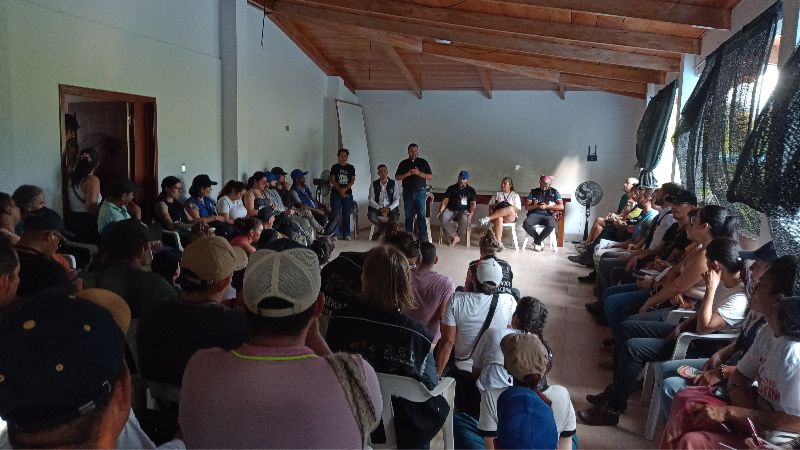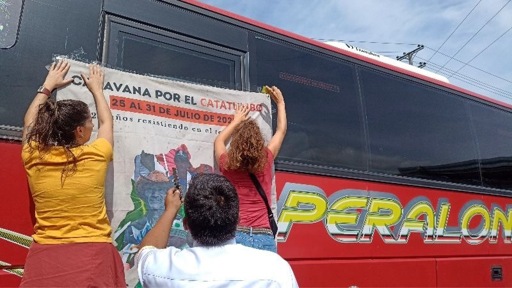With the support of peasants and social organizations across the country, Catatumbo welcomed an international humanitarian caravan that will tour its territories from July 25 to 31.
This initiative is promoted by the Network of Brotherhood and Solidarity with Colombia (REDHER). More than 100 caravan members will have the opportunity learn about and document the multiple violations of human rights and international humanitarian law faced by Catatumbo’s communities, and demand real guarantees from the Colombian state for a dignified life.
The territories they will visit
The tour will begin in the city of Ocaña and will pass through emblematic municipalities such as Convención, Teorama, and El Tarra, territories historically affected by armed conflict, state neglect, and the presence of various armed groups.
For seven days, the Caravan will hear firsthand testimonies from social leaders, peasant organizations, youth, and women who, despite the war, resist, and build peace initiatives.
“20 years resisting in the territory”
The first caravan to Catatumbo took place in August and September 2004, at a critical time of paramilitary consolidation.
That visit broke the siege of fear and allowed for the meeting “Integration, Life, and Territory” to take place. More than 400 delegates from Community Action Boards and community associations attended that historic meeting.
That event was the starting point for the creation of the Catatumbo Social Integration Committee (CISCA), one of the leading peasant organizations of the Catatumbo region.
Twenty years later, amid pressure, stigmatization, and systematic accusations against social and community leaders, this second caravan will take place under the slogan: “20 years of resistance in the territory”.
 Photo: Colombia Informa
Photo: Colombia Informa
Collect complaints from communities
The caravan is comprised of more than 100 national and international participants, including delegates from internationalist organizations, rural communities, social organizations, human rights defenders, and media. The caravan will also be accompanied by the United Nations verification mechanism, the Ombudsman’s Office, the Diocese of Ocaña, and the MAPP-OAS.
The main objective is to gather the reports of the numerous human rights violations, breaches of international humanitarian law, and structural violence resulting from state neglect that seriously affect the region.
These complaints will be summarized in a report submitted to national and international institutions and organizations.
In a context of increasing militarization, the silent expansion of paramilitarism, and the criminalization of social activism, the Caravan represents an urgent action for communities.
The risks faced by social leaders
In Catatumbo, exercising leadership or defending territory is cause for stigmatization and persecution.
“Speaking here today is like putting a tombstone on your back. Moving around the region, doing business with the governor’s office or municipal mayor’s offices, as well as going out to Ocaña to sell our products and stock up on food, became a high risk for us, and especially for the leaders,” say social leaders who are victims of threats and profiling.
Social Pact for the Territorial Transformation of Catatumbo
In addition to collecting complaints, the humanitarian caravan will monitor the State of Internal Unrest decree and verify the actual progress of the Social Pact for the Territorial Transformation of Catatumbo.
This pact, adopted as a commitment by the national government, seeks to structurally transform living conditions in the region. It was developed through a participatory process that included Communal Action Boards, social organizations, productive unions, women, youth, and Barí communities, as well as local authorities and other stakeholders.
This is one of the most extensive exercises in public policy formulation between the State and the communities of Catatumbo.
In addition to highlighting complaints along the route, the Caravan seeks to recognize and highlight the forms of resistance that have emerged in the face of state violence and neglect. These include expressions of popular power, networks of organized women, food sovereignty and agroecology initiatives, and community processes committed to improving living conditions in the region. All of this serves as a demonstration of resilience and persistence in building peace through a negotiated solution to the armed conflict.
Stigmatization of communities
The stigmatization campaign against rural communities was revealed by several human rights organizations, such as the Pueblos Legal Team.
A farmer in the region reported on social media a stigmatization campaign in the area. This led to some people being denied access to the Humanitarian Caravan.
A regional leader pointed out that peace is when we speak of social justice, sovereignty, and real participation in the transformation of our realities; a peace built from below that dignifies rural life and protects the territory. It is not only the peace of individuals, but also that of the land, the river, communities, and families.
“It’s a commitment to move from governments of war to governments for life, from extreme wealth to social justice, from paramilitarism to democracy, from the doctrine of national security to the defense of dignity, from lies to truth, from corruption to honesty, from impunity to justice, and from dispossession to the guarantee of non-repetition,” said the Catatumbo leader, who preferred not to be named for security reasons.
The participating organizations urgently called on the media, state institutions, and international organizations to raise awareness of this initiative and break the stigma surrounding Catatumbo.
The fight for life, territory, and social justice requires allies, reiterate national and international social organizations.
First published in Colombia Informa in Spanish.
The post Humanitarian caravan arrives in Catatumbo appeared first on Peoples Dispatch.
From Peoples Dispatch via this RSS feed


